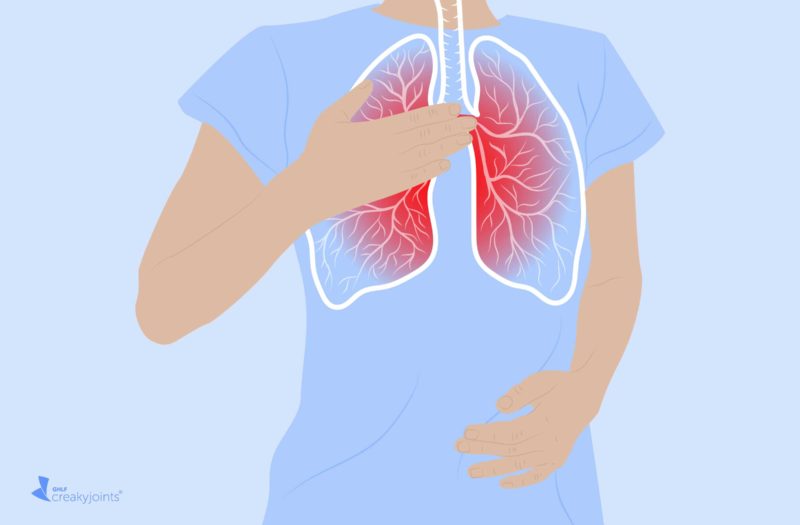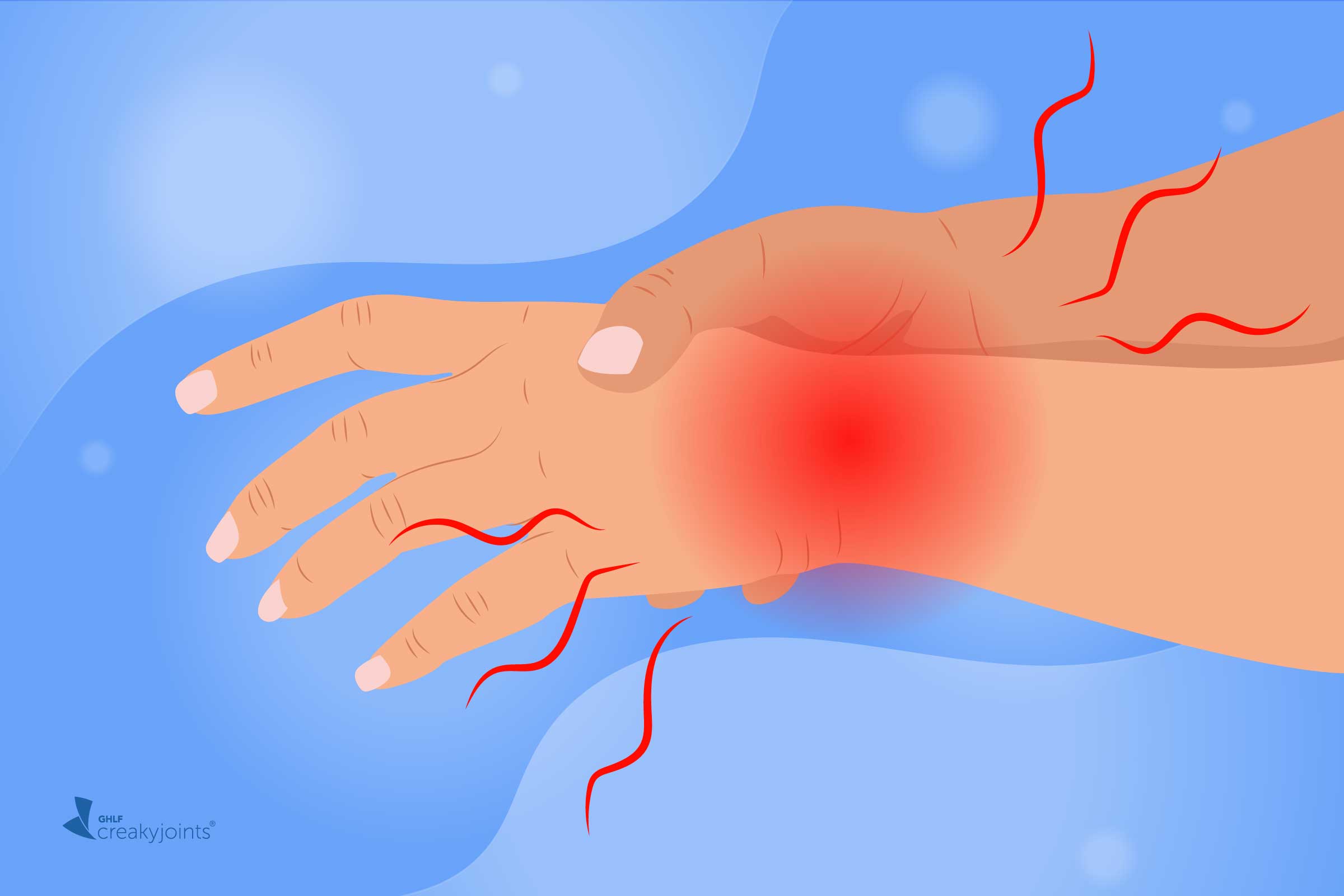As you make plans to get the flu shot this season, you should also talk to your doctor about whether you need another vaccine that protects against common respiratory infection: the pneumococcal vaccination.
While you may think of this as a vaccine for those ages 65 and older, that’s too late to wait if you have a form of inflammatory arthritis such as rheumatoid arthritis (RA), lupus, psoriatic arthritis (PsA), or axial spondyloarthritis (axSpA).
“Living with an autoimmune disease such as rheumatoid arthritis makes you vulnerable to serious infection and increases your risk of pneumonia,” says Justin Owensby, PharmD, PhD, a research pharmacist in the division of clinical immunology and rheumology at the University of Alabama at Birmingham (UAB). “It is especially important to get vaccinated against infectious diseases. Vaccines strengthen your immune response and protect your health and the health of those around you.”
Unfortunately, many people with inflammatory arthritis don’t get the pneumonia vaccine as part of their routine care. According to a recent study of rheumatoid arthritis patients, for example, a mere 10 percent of people treated in rural areas met the recommendation from the American College of Rheumatology (ACR) and Centers for Disease Control and Prevention (CDC) for getting the pneumococcal vaccine.
Here’s more information about how and when to get your pneumonia vaccine safely this year.
Why You Need the Pneumococcal Vaccine
Pneumonia is an infection in one or both lungs. It can be caused by bacteria, viruses, or fungi. When germs enter the lungs, they can overwhelm the immune system, causing inflammation, cough, fever, chills, and breathing problems.
Bacterial pneumonia, which may occur after you first have a viral infection such as a cold or the flu, is the most common type of pneumonia in adults.
Several types of bacteria can cause pneumonia, but Streptococcus pneumoniae (pneumococcus) is the type that most frequently causes pneumonia and other types of infection in adults.
Pneumococcal vaccines are designed to reduce the risk of infection from Streptococcus pneumoniae, explains Sarah B. Lieber, MD, MS, rheumatologist at Hospital for Special Surgery in New York City.
If you have a form of inflammatory arthritis, the same chronic, systemic inflammation that targets your joints can also decrease your body’s natural immune defenses. This increase your risk of serious infection like pneumonia. Plus, taking certain medications to manage your condition can also weaken or suppress the immune response, leaving you that much more susceptible to pneumonia.
Schedule and Timing for the Pneumonia Vaccine
If you’re between the ages of 19 and 64 and live with inflammatory arthritis, rheumatology experts recommend getting your pneumonia vaccine if you haven’t had one yet.
There are two kinds of pneumonia vaccines. You will need one of each, spaced at least eight weeks apart from each other.
- Pneumococcal conjugate vaccine (PCV13 or Prevnar13®)
- Pneumococcal polysaccharide vaccine (PPSV23 or Pneumovax23®)
PVC13, which was developed first, helps protect against 13 different strains of pneumococcal bacteria. The PPSV23 helps protect against an additional 10 different strains.
Unlike the flu vaccine, there’s no “season” or special time of year to get the pneumonia vaccine. You can get it at any time. Also, unlike the flu, it is not an annual vaccine. You only need to get it one time, with a follow-up dose a few years later.
For inflammatory arthritis patients who have not had a pneumococcal vaccine, the CDC recommends the following schedule.
- For adults aged 19 years or older, give one dose of PCV13, followed by one dose of PPSV23 at least eight weeks after PCV13.
- Then give a second dose of PPSV23 at least five years after the first dose of PPSV23.
- If the most recent dose of PPSV23 was administered before age 65 years, at age 65 years or older, administer another dose of PPSV23 at least 5 years after the last dose of PPSV23).
Effectiveness of the Pneumonia Vaccine
“These two vaccines work together to cover the most invasive serotypes [groups within a single species of bacteria] responsible for severe pneumonia,” says Dr. Owensby, adding that Streptococcus pneumoniae has more than 90 serotypes, which can all cause disease.
“PCV13 is recommended to be given first because of the immune response to the vaccine when given in this sequence,” he explains. “People who received PPSV23 as the initial dose had lower antibody responses after subsequent administration of PCV13 than those who had received PCV13 as the initial dose followed by a dose of PPSV23.”
In other words, your immune system responds better when you get PCV13 first, followed by PPSV23.
While recent studies have found lower rates of the vaccine’s efficacy in patients with inflammatory rheumatic diseases taking disease-modifying medications, experts still agree that getting your pneumonia vaccine is a must.
“All in all, it does reduce the risk of having complications,” says Vinicius Domingues, MD, a rheumatologist in Daytona Beach, Florida. “Pneumonia can be deadly.”
How Arthritis Medications May Impact the Effectiveness of the Pneumonia Vaccine
Pneumococcal vaccines are inactivated (non-live) and generally considered safe for people with inflammatory arthritis who are on immunosuppressive medications, says Dr. Lieber.
A study published in the journal Rheumatology found that conventional disease-modifying antirheumatic drugs (DMARDs) — medications such as methotrexate that are taken to reduce disease activity — can blunt the effects of both the PCV13 and PCV23 vaccines.
In other words, people who are taking these medications who get both vaccines may not have as much protection as those who are not taking immunosuppressing drugs.
“People with inflammatory arthritis such as rheumatoid arthritis have been shown to be able to develop protective antibodies after pneumococcal vaccination,” says Dr. Lieber. “However, since some immunosuppressive medications may be associated with dampened immune response to vaccines, your doctor may consider the timing of pneumococcal vaccination relative to your immunosuppressive regimen to maximize immune response.”
If possible, the ideal time to get vaccinated is before starting an immunosuppressant medication. If you’re already on one and have not been received the pneumococcal vaccines, you’ll need to weigh the decision of whether to temporarily hold your medication with your rheumatologist.
“It’s true that being on certain medication can decrease the efficacy of the vaccine — by maybe 30 to 40 percent — but I don’t typically stop my patients’ medications,” says Dr. Domingues. “If you stop taking your medications you can flare, and that’s what we don’t want. It’s very tricky; I take the response I can take. It’s better than nothing.”
As with the flu shot, you won’t get protection from the pneumonia vaccine for at least a few weeks after you receive it. And it’s still possible to get pneumonia after receiving the vaccine.
The Best Place to Get the Pneumonia Vaccine
If after months of limiting your outings to minimize exposure to COVID-19, the idea of heading to a doctor or pharmacy to get a pneumonia vaccine seems scary, know this: The CDC has outlined safe vaccination practices for local pharmacies, grocery stores, and doctor’s offices, including:
- Screening for COVID-10 symptoms
- Limiting crowding by providing specific appointment times
- Requiring staff to wear medical face masks and eye protection
- Requiring patients to wear cloth face coverings and practice respiratory hygiene, cough etiquette, and hand hygiene
- Providing separate vaccine areas or special hours for those at an increased risk for severe illness from COVID-19
- Limiting physical contact with barriers like clear plastic sneeze guards
- Directing patient traffic with a one-way flow through the site and six feet between patients in waiting areas, between vaccination stations, and in postvaccination monitoring areas
The Pneumonia Vaccine and COVID-19
Does getting the pneumonia vaccine provide any protection for people who get infected with COVID-19?
While many people with severe COVID-19 get severe pneumonia in both lungs — dubbed COVID-19 pneumonia — unfortunately, the pneumococcal vaccine does not appear to provide protection against this. According to the World Health Organization, the new coronavirus is “so new and different that it needs its own vaccine.”
Adds Dr. Domingues: “The pneumonia vaccines protect us from the most common bacteria’s that can cause pneumonia; COVID-19 is a virus.”
According to the Cleveland Clinic, the virus that causes COVID-19 can cause pneumonia directly: “Often times, we see that influenza can lead to secondary infections with other types of bacteria that the pneumonia shot prevents. But because coronavirus is bad enough on its own, the pneumonia shot doesn’t offer protection against it.”
That said, being up to date on the pneumonia vaccine offers other benefits during the COVID-19 pandemic.
Pneumonia symptoms, such as fever, cough, chest pain, and shortness of breath, can mimic symptoms of COVID. Being protected from pneumonia can help reduce the odds of you getting sick and requiring COVID testing and quarantining.
While many people who get pneumonia recover from it just fine at home, it can cause complications and require hospitalization, especially in more vulnerable people. Being vaccinated can reduce that risk.
And it’s important for people to avoid getting serious cases of flu, pneumonia, and other infections that can require hospitalization and add stress to a health care system that is already strained to care for people with COVID-19.
The bottom line: Talk to your rheumatologist or primary care physician to find out if your vaccines are up to date. Ask about getting the pneumonia vaccines if you’re not vaccinated. And continue taking other steps to keep healthy and prevent infections, such as wearing a face covering, practicing social distancing, and washing and sanitizing your hands frequently.
Be a More Proactive Patient with ArthritisPower
Join CreakyJoints’ patient-centered research registry to track your symptoms, disease activity, and medications — and share with your doctor. Learn more and sign up here.
Can the Pneumonia Shot Protect Me From Getting COVID-19? Cleveland Clinic. April 20, 2020. https://health.clevelandclinic.org/can-the-pneumonia-shot-protect-me-from-getting-covid-19.
Coronavirus disease (COVID-19) advice for the public: Mythbusters. World Health Organization. https://www.who.int/emergencies/diseases/novel-coronavirus-2019/advice-for-public/myth-busters#vaccines.
Frequently Asked Influenza (Flu) Questions: 2020-2021 Season. Influenza (Flu). U.S. Centers for Disease Control and Prevention. September 21, 2020. https://www.cdc.gov/flu/season/faq-flu-season-2020-2021.htm#anchor_1593184899499.
Hesselstrand R, et al. Immunogenicity and safety of pneumococcal vaccination in patients with systemic sclerosis. Rheumatology. April 2018. doi: https://doi.org/10.1093/rheumatology/kex471.
Immunizations in autoimmune inflammatory rheumatic disease in adults. UpToDate. https://www.uptodate.com/contents/immunizations-in-autoimmune-inflammatory-rheumatic-disease-in-adults/print.
Interview with Justin Owensby, PharmD, PhD, a research pharmacist in the division of clinical immunology and rheumology at the University of Alabama at Birmingham (UAB)
Interview with Sarah B. Lieber, MD, MS, rheumatologist at Hospital for Special Surgery in New York City
Interview with Vinicius Domingues, MD, a rheumatologist in Daytona Beach, Florida
Jacobs S. Pneumococcal Vaccination in Patients With Rheumatoid Arthritis: Taking Treatment Into Consideration. Rheumatology Advisor. November 16, 2017. https://www.rheumatologyadvisor.com/home/topics/rheumatoid-arthritis/pneumococcal-vaccination-in-patients-with-rheumatoid-arthritis-taking-treatment-into-consideration.
Kirn TF. Give Pneumococcal Vaccine Before Methotrexate. MDEdge. February 1, 2005. https://www.mdedge.com/internalmedicine/article/13702/infectious-diseases/give-pneumococcal-vaccine-methotrexate.
Kunzmann K. Pneumococcal Vaccination Rates Low Among Rheumatoid Arthritis Patients. HCP Live. https://www.hcplive.com/view/pneumococcal-vaccination-rheumatoid-arthritis.
Pneumococcal Vaccination: Summary of Who and When to Vaccinate. Vaccines and Preventable Diseases. U.S. Centers for Disease Control and Prevention. https://www.cdc.gov/vaccines/vpd/pneumo/hcp/who-when-to-vaccinate.html.






